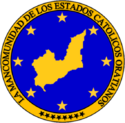President of Auratia
| President of Auratia | |
|---|---|
| Presidente de Oratia | |
 Great Seal of Auratia | |
 | |
| Style | Mr. President (informal) Excelentísimo Señor (formal) |
| Type | Head of state |
| Status | Supreme executive organ |
| Residence | Presidential Estate, Cienflores |
| Nominator | Auratian Senate |
| Appointer | Governors of the States sworn in by the Archbishop of Puerto del Rey |
| Term length | Seven years, non-renewable |
| Constituting instrument | Treaty of Puerto del Rey |
| Precursor | Monarchy of Auratia |
| Formation |
|
| First holder | Enrico Pía |
| Salary | $320,925 per annum |
The President of Auratia (Oratiano: Presidente de Oratia), is the head of state of the Commonwealth of Auratian Catholic States. Established under the Treaty of Puerto del Rey, Auratia's constitution, the president is the source of final executive authority and, in theory, has a wide array of powers entrustred in his office. In practice, however, the president is a ceremonial and symbolic figurehead. The president is first on the Auratian order of precedence.
The office of the Auratian President was created in 1820, with Enrico Pía as the office's inagural holder. Throughout the 19th century, the president was the most powerful and influencial figure in Auratian poltiics, excercising supreme authority over the nation's executive. However, reforms beginning near the turn of the 20th century saw a shift in power from the president to the Commonwealth Cabinet, headed by the premier. This changes were accelerated following the abuse of power of President Emilio Pirineo during the Great War. The eighth amendment to the Treaty of Puerto del Rey, passed in the wake of the Great War, introduced a term limit and placed restrictions on the president's powers.
The president is appointed by a convention of the governors of the Auratia's eight States on the nomination of the Auratian Senate, the nation's federal legislature. Although in theory the governors may reject the Senate's nomination and appoint whomever they wish, it has become common practice for the governors to accept the Senate's nomination. The president serves for a seven-year non-renewable term.
As head of state, the president broadly entrusted with protecting the rights of the States and the dignity of Auratia's constitution. He is the commander-in-chief of the Auratian Armed Forces and the nation's chief representative. The president appoints and dismisses the premier of Auratia and ministers of the Commonwealth Cabinet, as well as other members of Auratia's bureaucracy and civil service. The president signs, and may veto, laws passed by the Senate. In times of national emergency, the president is invested with emergency powers. Although the president may excersise most, but not all, of his powers unilaterally, he traditionally does not do so without first receiving the advice of the premier. The president's most important role is acting as a check against the power of the Commonwealth Cabinet and as a mediator.
Since the president is generally a non-paritsan and politically-detached figure, he is typically one of the most popular politicians in Auratia. The current president is Enrique Santos Domínguez, who has been serving since 2015.
